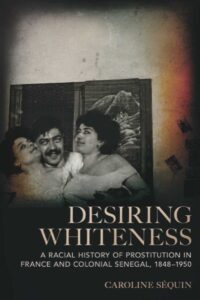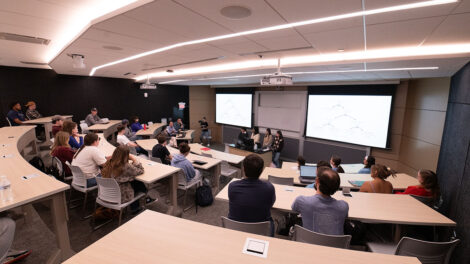Prof. Caroline Séquin releases new book, ‘Desiring Whiteness: A Racial History of Prostitution in France and Colonial Senegal’

Photo by Emily Feinsod
Caroline Séquin, assistant professor of history
Desiring Whiteness: A Racial History of Prostitution in France and Colonial Senegal, 1848-1950
Released Oct. 15, 2024
Desiring Whiteness, a summary:
Desiring Whiteness uncovers the intertwined histories of commercial sex and racial politics in France and the French Empire. The absence of laws banning interracial marriages in the century following the abolition of slavery in 1848 has served to reinforce two myths about modern France—first as a sexual democracy and second as a colorblind nation where all French citizens can freely marry whomever they wish regardless of their race. The book challenges this narrative of French exceptionalism by revealing the role of prostitution regulation in policing intimate relationships across racial and colonial boundaries in an imperial nation-state that claimed to be race-blind.
Desiring Whiteness traces the rise and fall of the “French model” of prostitution policing in the century following the abolition of slavery. It compares the seemingly disparate racial politics of commercial sex in various port cities and garrison towns across France and Dakar, Senegal, the main maritime entry point of French West Africa, to expose how metropolitan and colonial brothels followed a similar racial logic that contributed to uphold white dominance. Moreover, vivid reconstructions of the lives of sex workers, brothel keepers, and other third parties illuminate how the reproduction of whiteness was not simply imposed from above but also enacted from below and through quotidian sexual and business practices. Ultimately, the book uncovers how the making of white France occurred, ironically, through the control of a form of sexuality often deemed nonreproductive: commercial sex.
 Where is it available?
Where is it available?
The book is available in paperback, hardcover, and Kindle/ebook editions, and it can be purchased on the Cornell University Press website (30% off with code 09BCARD) as well as on major online retail sites such as Amazon.
Why did you write this book, and why should people at Lafayette and beyond read it?
I wrote this book because I wanted to better understand the articulation of race, gender, and sexuality in the French context. I grew up in France and remember how horrified some of my family members were when a white cousin of mine chose to marry a Black musician from Senegal. My family’s reaction stood in sharp contrast with this idea that French people, and French society more generally, were race-blind. This experience made me wonder how a society that did not have any laws banning interracial marriage could nonetheless attempt to prevent the formation of interracial unions and multiracial families that would undermine this false notion that to be French meant to be white. I went on a search to find out how the regulation of sexuality could serve to police racial boundaries. I quickly realized that the regulation of commercial sex was key in this process. Whether in France or in colonial Senegal, French civil and military authorities created prostitution policies that facilitated white French men’s and colonial subjects’ access to paid sexual encounters within brothels, in an attempt to deter them from developing romantic relationships across racial and colonial lines outside of the brothels.
The book can be instructive to anyone who is interested in understanding how race-blind or post-racial societies, as so many claim to be nowadays, can in fact police racial relations in insidious ways, and in particular through the regulation of sex.
How will this research impact your work and/or classroom at Lafayette?
I have been working with Special Collections and College Archives to identify and purchase material pertaining to the history of sexuality that I can use in two of my courses, FYS 144: Making Sex and WGS 243: Global Sexualities. In the spring I plan to bring students from WGS 243, a new course that I will be teaching for the first time, to Special Collections. The goal is to give students hands-on experiences analyzing primary sources on sexuality, so that they can reflect on how ideas and policies around sexuality have changed over time.
Is there anything else we should know?
I will be giving a book talk at Skillman Library; look out for more information about this event in the early spring.

